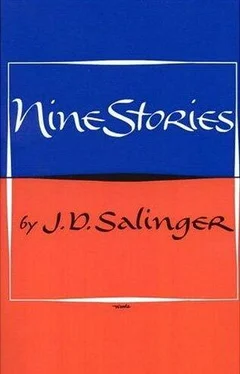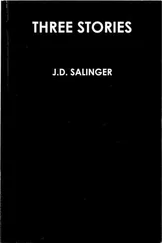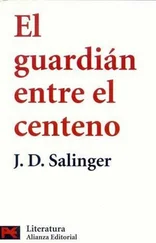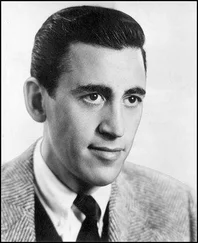Jerome Salinger - Nine Stories
Здесь есть возможность читать онлайн «Jerome Salinger - Nine Stories» весь текст электронной книги совершенно бесплатно (целиком полную версию без сокращений). В некоторых случаях можно слушать аудио, скачать через торрент в формате fb2 и присутствует краткое содержание. Год выпуска: 1953, Издательство: Little Brown, Жанр: Классическая проза, на английском языке. Описание произведения, (предисловие) а так же отзывы посетителей доступны на портале библиотеки ЛибКат.
- Название:Nine Stories
- Автор:
- Издательство:Little Brown
- Жанр:
- Год:1953
- ISBN:нет данных
- Рейтинг книги:4 / 5. Голосов: 2
-
Избранное:Добавить в избранное
- Отзывы:
-
Ваша оценка:
- 80
- 1
- 2
- 3
- 4
- 5
Nine Stories: краткое содержание, описание и аннотация
Предлагаем к чтению аннотацию, описание, краткое содержание или предисловие (зависит от того, что написал сам автор книги «Nine Stories»). Если вы не нашли необходимую информацию о книге — напишите в комментариях, мы постараемся отыскать её.
Nine Stories — читать онлайн бесплатно полную книгу (весь текст) целиком
Ниже представлен текст книги, разбитый по страницам. Система сохранения места последней прочитанной страницы, позволяет с удобством читать онлайн бесплатно книгу «Nine Stories», без необходимости каждый раз заново искать на чём Вы остановились. Поставьте закладку, и сможете в любой момент перейти на страницу, на которой закончили чтение.
Интервал:
Закладка:
Nicholson was looking at him, studying him. “I believe you said on that last tape that you were six when you first had a mystical experience. Is that right?”
“I was six when I saw that everything was God, and my hair stood up, and all that,” Teddy said. “It was on a Sunday, I remember. My sister was only a very tiny child then, and she was drinking her milk, and all of a sudden I saw that she was God and the milk was God. I mean, all she was doing was pouring God into God, if you know what I mean.”
Nicholson didn’t say anything.
“But I could get out of the finite dimensions fairly often when I was four,” Teddy said, as an afterthought. “Not continuously or anything, but fairly often.”
Nicholson nodded. “You did?” he said. “You could?”
“Yes,” Teddy said. “That was on the tape … Or maybe it was on the one I made last April. I’m not sure.”
Nicholson took out his cigarettes again, but without taking his eyes off Teddy. “How does one get out of the finite dimensions?” he asked, and gave a short laugh. “I mean, to begin very basically, a block of wood is a block of wood, for example. It has length, width—”
“It hasn’t. That’s where you’re wrong,” Teddy said. “Everybody just thinks things keep stopping off somewhere. They don’t. That’s what I was trying to tell Professor Peet.” He shifted in his seat and took out an eyesore of a handkerchief—a gray, wadded entity—and blew his nose. “The reason things seem to stop off somewhere is because that’s the only way most people know how to look at things,” he said. “But that doesn’t mean they do.” He put away his handkerchief, and looked at Nicholson. “Would you hold up your arm a second, please?” he asked.
“My arm? Why?”
“Just do it. Just do it a second.”
Nicholson raised his forearm an inch or two above the level of the armrest. “This one?” he asked.
Teddy nodded. “What do you call that?” he asked.
“What do you mean? It’s my arm. It’s an arm.”
“How do you know it is?” Teddy asked. “You know it’s called an arm, but how do you know it is one? Do you have any proof that it’s an arm?”
Nicholson took a cigarette out of his pack, and lit it. “I think that smacks of the worst kind of sophistry, frankly,” he said, exhaling smoke. “It’s an arm, for heaven’s sake, because it’s an arm. In the first place, it has to have a name to distinguish it from other objects. I mean you can’t simply—”
“You’re just being logical,” Teddy said to him impassively.
“I’m just being what?” Nicholson asked, with a little excess of politeness.
“Logical. You’re just giving me a regular, intelligent answer,” Teddy said. “I was trying to help you. You asked me how I get out of the finite dimensions when I feel like it. I certainly don’t use logic when I do it. Logic’s the first thing you have to get rid of.”
Nicholson removed a flake of tobacco from his tongue with his fingers.
“You know Adam?” Teddy asked him.
“Do I know who?”
“Adam. In the Bible.”
Nicholson smiled. “Not personally,” he said dryly.
Teddy hesitated. “Don’t be angry with me,” he said. “You asked me a question, and I’m—”
“I’m not angry with you, for heaven’s sake.”
“Okay,” Teddy said. He was sitting back in his chair, but his head was turned toward Nicholson. “You know that apple Adam ate in the Garden of Eden, referred to in the Bible?” he asked. “You know what was in that apple? Logic. Logic and intellectual stuff. That was all that was in it. So—this is my point—what you have to do is vomit it up if you want to see things as they really are. I mean if you vomit it up, then you won’t have any more trouble with blocks of wood and stuff. You won’t see everything stopping off all the time. And you’ll know what your arm really is, if you’re interested. Do you know what I mean? Do you follow me?”
“I follow you,” Nicholson said, rather shortly.
“The trouble is,” Teddy said, “most people don’t want to see things the way they are. They don’t even want to stop getting born and dying all the time. They just want new bodies all the time, instead of stopping and staying with God, where it’s really nice.” He reflected. “I never saw such a bunch of apple-eaters,” he said. He shook his head.
At that moment, a white-coated deck steward, who was making his rounds within the area, stopped in front of Teddy and Nicholson and asked them if they would care to have morning broth. Nicholson didn’t respond to the question at all. Teddy said, “No, thank you,” and the deck steward passed them by.
“If you’d rather not discuss this, you don’t have to,” Nicholson said abruptly, and rather brusquely. He flicked his cigarette ash. “But is it true, or isn’t it, that you informed the whole Leidekker examining bunch—Walton, Peet, Larsen, Samuels, and that bunch—when and where and how they would eventually die? Is that true, or isn’t it? You don’t have to discuss it if you don’t want to, but the way the rumor around Boston—”
“No, it is not true,” Teddy said with emphasis. “I told them places, and times, when they should be very, very careful. And I told them certain things it might be a good idea for them to do … But I didn’t say anything like that. I didn’t say anything was inevitable, that way.” He took out his handkerchief again and used it. Nicholson waited, watching him. “And I didn’t tell Professor Peet anything like that at all. Firstly, he wasn’t one of the ones who were kidding around and asking me a bunch of questions. I mean all I told Professor Peet was that he shouldn’t be a teacher any more after January—that’s all I told him.” Teddy, sitting back, was silent a moment. “All those other professors, they practically forced me to tell them all that stuff. It was after we were all finished with the interview and making that tape, and it was quite late, and they all kept sitting around smoking cigarettes and getting very kittenish.”
“But you didn’t tell Walton, or Larsen, for example, when or where or how death would eventually come?” Nicholson pressed.
“No. I did not,” Teddy said firmly. “I wouldn’t have told them any of that stuff, but they kept talking about it. Professor Walton sort of started it. He said he really wished he knew when he was going to die, because then he’d know what work he should do and what work he shouldn’t do, and how to use his time to his best advantage, and all like that. And then they all said that … So I told them a little bit.”
Nicholson didn’t say anything.
“I didn’t tell them when they were actually going to die, though. That’s a very false rumor,” Teddy said. “I could have, but I knew that in their hearts they really didn’t want to know. I mean I knew that even though they teach Religion and Philosophy and all, they’re still pretty afraid to die.” Teddy sat, or reclined, in silence for a minute. “It’s so silly,” he said. “All you do is get the heck out of your body when you die. My gosh, everybody’s done it thousands and thousands of times. Just because they don’t remember it doesn’t mean they haven’t done it. It’s so silly.”
“That may be. That may be,” Nicholson said. “But the logical fact remains that no matter how intelligently—”
“It’s so silly,” Teddy said again. “For example, I have a swimming lesson in about five minutes. I could go downstairs to the pool, and there might not be any water in it. This might be the day they change the water or something. What might happen, though, I might walk up to the edge of it, just to have a look at the bottom, for instance, and my sister might come up and sort of push me in. I could fracture my skull and die instantaneously.” Teddy looked at Nicholson. “That could happen,” he said. “My sister’s only six, and she hasn’t been a human being for very many lives, and she doesn’t like me very much. That could happen, all right. What would be so tragic about it, though? What’s there to be afraid of, I mean? I’d just be doing what I was supposed to do, that’s all, wouldn’t I?”
Читать дальшеИнтервал:
Закладка:
Похожие книги на «Nine Stories»
Представляем Вашему вниманию похожие книги на «Nine Stories» списком для выбора. Мы отобрали схожую по названию и смыслу литературу в надежде предоставить читателям больше вариантов отыскать новые, интересные, ещё непрочитанные произведения.
Обсуждение, отзывы о книге «Nine Stories» и просто собственные мнения читателей. Оставьте ваши комментарии, напишите, что Вы думаете о произведении, его смысле или главных героях. Укажите что конкретно понравилось, а что нет, и почему Вы так считаете.











